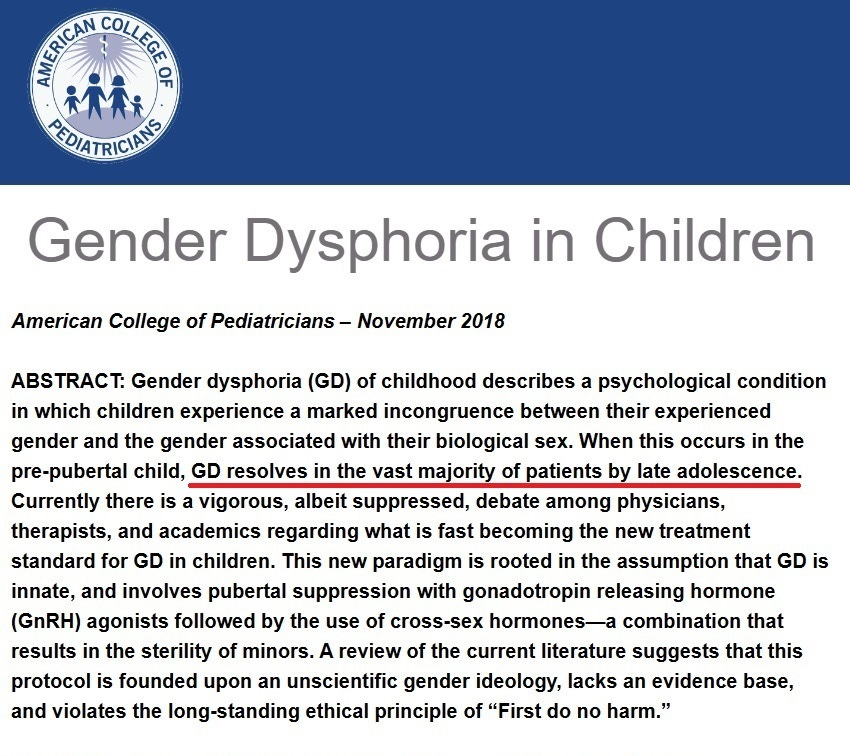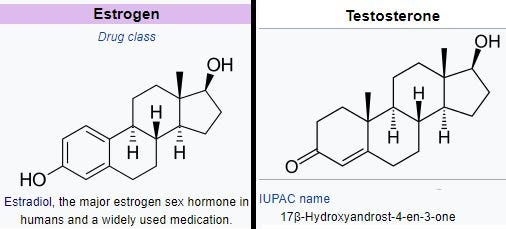Gender-Affirming Care for Kids
And Both Sides of the Gender-Identity Issue
Adults who choose to transition to a different gender often have good reason, and are old enough to make their own choice, so should be accepted. However, thoughtful people should be allowed to discuss whether it's wise for children to make similar choices before they're old enough to understand the impact of such life-altering decisions. We don't willingly let kids choose whether they can smoke or drink or drive or enter the military for good reason. In the case of gender identity, human feelings (including sexual attraction) are strongly affected by numerous hormones and other biochemicals that usually change dramatically as we grow through adolescence and beyond. That's one of the reasons growing up is so often a difficult process requiring loving guidance from adults.
Most parents remember some of the fantastic make-believe stories their kids came up with when they were young, and most children were fortunate their parents didn’t take their firmly-held desires too seriously, whether to be a dog or cat, or perhaps a pirate with a peg leg & only one eye. It’s the harmless way kids exercise their natural creativity. Similar fantasy and exploration apply to adolescence where youngsters are competing with each other for attention and will say and do remarkable things to get noticed. The Power of Suggestion is even more powerful today given the pervasiveness of social media, and the attention being given to kids who believe they’re different for any reason (social contagion).
Before puberty, most kids tend to be asexual (essentially nonbinary) especially compared to after puberty. Much of what they know of gender roles (and stereotypes) is learned from their environment (parents and caretakers and teachers and siblings and friends and media). It’s good to encourage kids to be themselves, yet we should remember that ongoing changes in hormone levels will have a strong impact on what they feel and how they think, and that adolescence is a period of great change in many ways.
Today, out of empathy for those struggling with gender identity during the developmentally challenging phase we call adolescence (and even earlier in childhood) we witness parents and health care professionals seeking to treat youngsters before puberty with pharmaceuticals and even talking about surgery instead of providing counseling and advising patience while allowing nature to take its course which in most cases it does. One has to wonder why so many adults (including medical doctors who all took biology and biochemistry as pre-med requirements) now claim to believe prepubescent kids “know” what gender they are before their genetic makeup has a chance to express itself with the cascade of hormones and other biochemicals that change greatly as they go through puberty. Have today’s adults forgotten how their feelings of for example sexual attraction changed so dramatically back when they went through that phase of their lives?
Looking into options for children suffering from what used to be called gender dysphoria it's sad that counseling too often takes a back seat to treatment with hormones and even surgery, when in most cases, kids' feelings change as time passes and nature takes its course. It's understandable to want to help kids who are in distress, especially when suicide is a risk, yet experienced parents have seen their kids grow through many "phases" of various types, few of which actually take root, especially when they’re loved. Serious mental health challenges and suicide sadly still occur with some who do go through transition. Counseling is the best care option at this age. Let adults make choices after their feelings have stabilized and they're old enough to understand the permanence (and appreciate the experiences of others who've gone through transition). Sometimes the best therapy for kids is to teach them distress is common at that age, and it's normal for feelings to change dramatically as they grow through puberty. It’s difficult to summon the patience required to wait for the many changes associated with puberty to occur, yet in the long run, other courses of action are even more difficult.
Here are wise words from someone with experience
Gender identity for pre-pubescent kids who don’t yet have hormone and other neurochemical levels that will later establish their adult feelings, nearly always comes into congruence with their genetic makeup where females have two XX chromosomes while males have an X and a Y, as explained by the American College of Pediatricians.
It shouldn’t be too surprising that many kids at times identify as the opposite gender, especially with the suggestive prompting they’re now exposed to from an early age, and from others who’ve gained attention from doing it, and also from parents and other adults concerned about “misgendering” them. What parent isn’t concerned about potentially ruining their kids’ lives, yet there’s more than one way to do that.
With guidance like this person provides, is it any wonder more kids are “deciding” they’re transgender? The power of suggestion is strong, and parents (and some teachers) who misuse their standing like this person are doing great harm to innocent kids who otherwise will find themselves through the normal course of growing up without outside meddling.
Here’s another example of medical professionals rushing to gender transition rather than psychological counseling.
Kids crave attention, and current suggestions they’re now inundated with in early elementary school that they can be a different gender opens up dangerous doors that without the power of suggestion wouldn’t even occur to most kids.
Regarding what’s innate (genetically preprogrammed) and what’s learned, it’s interesting that scientists who’ve for decades told us we’re hard-wired from birth as either hetero- or homosexual are now telling us to ignore the impact of being born with either two X chromosomes (female) or an X and a Y (male) because our feelings can change at any time. They’re partly correct because our feelings do change dramatically as we go through adolescence and especially puberty, and by the time we’re 20, some people really are transgender for a variety of reasons. We should respect that for adults, yet we should know that kids before puberty can’t know whether they’re transgender or not since they haven’t yet given nature a chance to put them through puberty with all the complex hormone and other biochemical changes in our bodies. Note the similar molecular structures of testosterone compared to estradiol and progesterone, yet their physiological effects are so starkly different. Let’s not ignore what science teaches us about these and many other biochemicals including peptides and proteins. #science
Another controversial issue that affects female athletes is when youngsters and teenagers do transition, as many have, some trans athletes take roster spots, scholarships, and trophies away from (and potentially injure) females and that hardly abides to the spirit of protecting female opportunities. At the risk of overgeneralizing, females tend to feel greater trust and empathy for others, while some males have been known for gaming the system to their own selfish advantage. While that doesn’t explain near all decisions to become trans, it appears to be a factor in some of them. It’s not “anti-trans” to expect trans girls and women to compete in the “Open” division (boys/mens) with others born male, rather it’s “pro female” and pro fairness.
In conclusion, let kids be kids rather than recommending a cure that’s usually more harmful than the problem. Let’s also not forget that kids change their minds all the time; smart adults protect them from changes that are essentially irreversible.
note- this blog was reproduced from this Substack post







Comments
Post a Comment